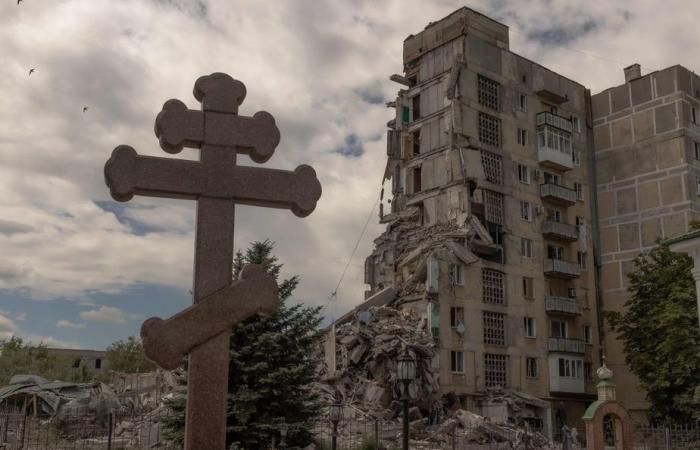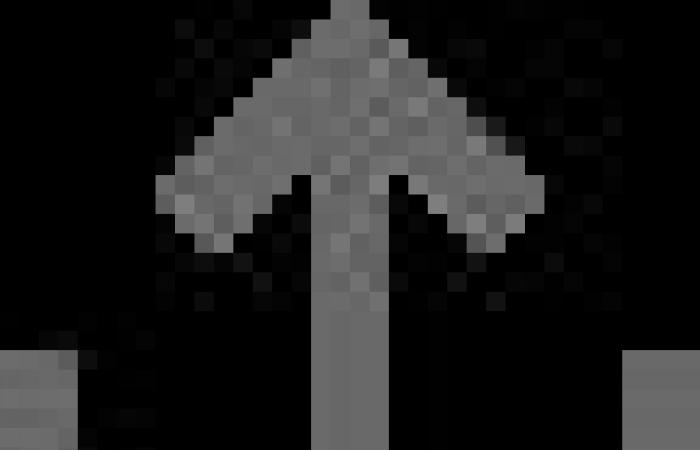(Toretsk) Although living in eastern Ukraine, ravaged by fighting, Galina Porochina has long been spared from the war. Its mining town of Toretsk is nestled in a sector of the front that, until recently, was relatively quiet.
Published yesterday at 10:42 am
Andrii KALCHENKO et Roman PILIPEY
France Media Agency
That was until early June, when Russian rockets began raining down on the town, disrupting his life and that of other residents.
Today, Galina is forced to fill bottles at the public fountain, before returning to her home without water and electricity. She learns to live hidden in the basement of her house to avoid bombs.
“When everything works, it seems like everything is normal. The water has disappeared, it’s uncomfortable, but we’ve gotten used to it,” explains this 63-year-old retired nursery assistant.
Toretsk lies 40 kilometres north of the large Russian-occupied city of Donetsk and less than five kilometres from the front line, where Moscow’s troops are pushing against an opponent exhausted after more than two and a half years of war.
Despite the daily strikes, Galina refuses to leave, because her son and his mother are buried in the city cemetery.
“It’s the kind of bond that’s very hard to break. I can’t leave. I can’t,” she said before breaking down in tears.
“It’s so painful when you can’t go to the cemetery. »
“Broken City”
Toretsk, whose population was 12,000 before the invasion, is an important lock in this sector of the front, the fall of which would give the Russian army access to Kostiantynivka, and then eventually to Kramatorsk, the Kremlin’s ultimate objective in this region.
“It was a good town. Small, compact and always clean. A lot of people stayed here and got married,” recalls Oleksandr, Galina’s husband.
With a lamp on his forehead, he tries to repair a pair of shoes in the dark. He and his wife thought that peace in the city would last.
“There were concerts all the time, local musicians playing in the park for dance parties […] it was our park,” he says.
Today, the buildings are gutted and onlookers no longer venture into the park. Shellfire echoes in the streets and black smoke rises on the horizon.
“The city is dead. Broken,” laments Galina. “Now the most important thing is human life, survival, to save even the memory of family members.”
” We leave ”
Oleksandr Borbrik, who was born and raised in Toretsk, is also a local child. But at 41, he is about to leave his life behind, including his gutted grocery store and his ruined house.
“Every day there are dozens of strikes. It’s scary to stay here. We are leaving,” explains this well-built man with close-cropped hair and blue eyes.
In his empty, dark grocery store, he oversees the move, unsure of what tomorrow will bring. “We haven’t thought about it yet,” he admits.
The governor of the Donetsk region, Vadym Filachkine, had, at the start of the week, urged residents to evacuate, while the bombings are taking place daily.
Because on the front, the situation is “difficult”. Wrapped up in his balaklava, Commander Kurt, as he calls himself, does not mince his words about Moscow’s attacks on the city.
” Errors ”
“During the period when the rotation (of troops) was carried out, some mistakes were made. The enemy analyzed them and used them,” he concedes, holding his assault rifle tightly.
“Dragon’s teeth”, a kind of concrete block designed to hinder tanks, have been erected all around the city, but Kurt is not convinced of their effectiveness.
“The external defense lines mean nothing,” he explains, recalling the fate of Ukrainian cities that fell under the control of Moscow, despite numerous fortifications.
According to him, Russian forces have been pounding the city since the beginning of June with very destructive hovering bombs and attempting incursions in small teams.
Despite everything, some residents of Toretsk will not flee, like Galina.
“We have been suffering this type of oppression for ten years,” explains the former kindergarten teacher, referring to the time when separatists supported by the Kremlin seized entire sections of the Donetsk region, from 2014. “Now, I no longer make predictions,” she says.







